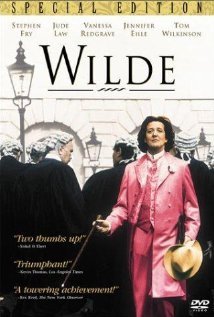“The Wilde One”

| None | Light | Moderate | Heavy | |
|---|---|---|---|---|
| Language | ||||
| Violence | ||||
| Sex | ||||
| Nudity |
Content:
(Pa, HoHoHo, L, SSS, N) Pagan worldview revolving around homosexual lifestyle; 5 mild obscenities; no violence; several scenes of homosexual activity; and, rear male nudity.
More Detail:
Brian Gilbert’s WILDE offers a comprehensive portrait of playwright Oscar Wilde (Stephen Fry) and the disastrous homosexual lifestyle that destroyed his life and those around him. Taking place in England in the late 1800s, the story focuses on Wilde’s life from his marriage to Constance (Jennifer Ehle) to his death in 1900 at the age of 46. Wilde, a big, gentle man, describes his marriage to Constance as “sympathetic,” viewing her as a good match for him because he constantly needs an audience. He also professes his love for her. The couple quickly have two sons. As Constance spends her time looking after them, Wilde is gets to spend more time away from home writing and directing his plays.
Wilde’s first experience with homosexuality is with Robbie Ross (Michael Sheen), an attractive young Canadian who helps Constance with the children. After intercourse, Wilde tells Robbie, “I feel like a city that has been under siege for 20 years. Now, I feel relieved.” Before long, Wilde takes on a second lover as he continues exploring the dictates of his sin nature.
At a reception, given after a successful performance of his new play, “Lady Windemere’s Fan,” Wilde meets a young attractive man, Bosie Douglas (Jude Law), who will become the one he will love obsessively for the rest of his life. Bosie lets Wilde know how much he enjoys his work, comparing his wit to a foil that cuts through shirt fronts and draws blood. “The more frivolous you seem, the more serious you are,” Bosie quips as he stands in awe of Wilde. Wilde falls in love with this spoiled aristocrat, and they become inseparable.
In the meantime, Constance is being totally neglected, and her motherly obligations keep her housebound. She begs Wilde to spend more time at home with her and the children, but he claims that he needs space and time to write his plays. She remains the faithful and forgiving wife accepting his excuses.
Trouble ensues when Bosie’s brutal father calls Wilde a “sodomite” in public, and Wilde sues him for libel. However, at trial, Wilde is charged with committing indecent acts with young men and is sent to prison and hard labor for two years. During this time, he continues to think of Bosie, referring to him as “sweet flower,” and Bosie in turn continues to claim his love for Wilde. Constance visits Wilde in prison, telling him that she needs an operation for her back problems which have been causing her a lot of pain. Wilde apologizes for his neglect and tearfully explains, “If we could only choose our natures.” (Of course, men are locked into their sin nature, but there is redemption through Jesus Christ, something Wilde never knew.) Constance agrees to let Wilde see his children when he gets out of prison on condition that he not see Bosie any longer.
Although a well-depicted profile of one of the most talented playwrights of the 1800s, the film will greatly disturb a good number of viewers because of its candid portrayal of Wilde’s homosexual lifestyle. There are a good number of unnecessary scenes of Wilde in bed with his lovers, kissing and having intercourse. The film appears to completely focus on Wilde’s homosexuality while neglecting his development as a writer. The audience only gets a sampling of his clever wit from time to time throughout the movie, which is unfortunate because it is his spontaneous cleverness that exemplifies the essence of Wilde as an artist.
The performances in this film are quite accomplished because the characters are well cast. Stephen Fry brilliantly captures the superb wit of Wilde while portraying his obsession for Bosie. Director Brian Gilbert’s attention to detail creates a high degree of authenticity in dÈcor and costume, thereby capturing the flavor of the late 19th century for us to visually experience.
Interestingly, Wilde is portrayed as a victim of his “nature”, and there isn’t any place in the movie where he doesn’t struggle with being unfaithful to his wife and family, even though the hurt to his wife and family is acknowledged. Wilde talks about “living life with dishonesty” if one doesn’t follow their nature, yet there is no mention of being dishonest to one’s family or to God when one follows their sin nature or the fact that God gave His only begotten Son to set us free by His Death and resurrection. As such, this movie conveys the wrong message about submitting to one’s feelings and desires despite its destructive consequences.



